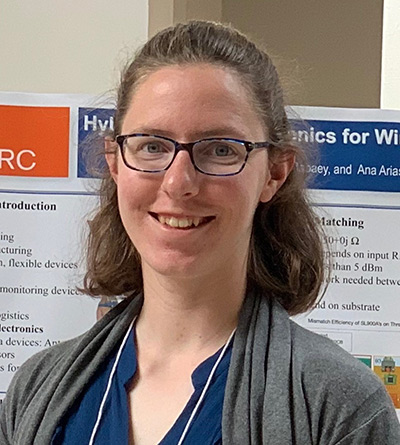Precision agriculture is a set of growing practices that tailors inputs including water and fertilizer precisely for different locations across a field. Precision agriculture allows for more efficient use of resources but requires high spatial resolution data to inform fertilizer application. One way to acquire the necessary information is to use a network of sensors in the soil. In order for such sensors to be useful, they should be simple to install, easily mass-produced and not impede operations during the growing season or during harvest.

Carol Baumbauer from the University of California, Berkeley, will present her work towards a network of printed, degradable soil nitrate sensors. The talk will include a discussion of the advantages and characteristics of different printing techniques, the development of a potentiometric nitrate sensor, the sensor’s integration with passive RFID communication, and progress towards creating the elements out of biodegradable materials.
Carol Baumbauer is a doctoral candidate in the Department of Electrical Engineering and Computer Science (EECS) at the University of California, Berkeley. She works in the printed and flexible electronics research group, advised by Dr. Ana Arias.
Carol’s work brings together the fields of printed electronics, RF systems, and precision agriculture. She earned her B.S. in electrical engineering and B.A. in modern languages from Montana State University in 2017. Her undergraduate research focused on nanostructured optical polarization filters. Carol earned her M.S. in EECS from UC Berkeley in 2019 for her work on printed passive RFID sensor tags. She was awarded the Berkeley Chancellor’s Fellowship and is an NSF Graduate Research Fellow.
Zoom link, meeting ID: 940 6629 4304, passcode: 792850